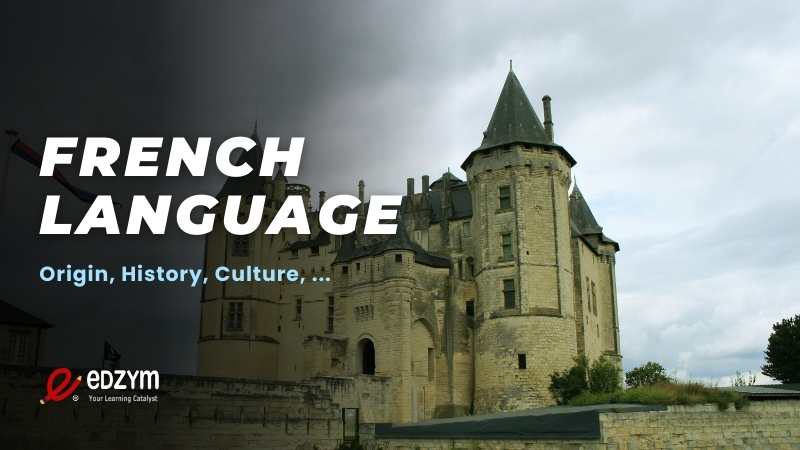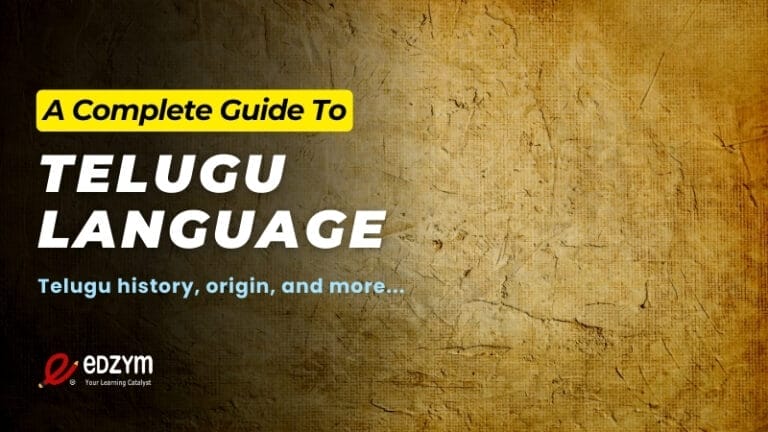French Language Explored | French History, Origin and More
French language, often called “the language of love,” has a rich history and global presence that extends far beyond its origins in France. With over 220 million speakers worldwide, it holds the distinction of being one of the most widely spoken languages across continents. Beyond its linguistic reach, French culture, art, and diplomacy have left an indelible mark on the world stage. This article explores the unique characteristics of the French language and its profound cultural impact, shedding light on why it continues to captivate people around the globe.
Historical Background
Let’s explore the rich history of the French language, tracing its origins and evolution into its modern form.
Origin of French language
The French language finds its roots in Vulgar Latin, which was introduced to Gaul (modern-day France) by Roman conquerors and settlers starting from the 1st century BCE. Gaul, inhabited by Celtic tribes such as the Gauls, Belgae, and Aquitani, gradually adopted Latin as the language of administration, trade, and everyday communication under Roman rule. Over time, Vulgar Latin, spoken by soldiers, settlers, and local inhabitants, evolved alongside Celtic languages spoken in the region.

Evolution of French language
The evolution of French accelerated notably during the medieval period, particularly after the fall of the Western Roman Empire in the 5th century CE. As Roman authority waned, the Franks, a Germanic tribe, began to assert dominance in Gaul, eventually establishing the Merovingian and Carolingian dynasties. This era witnessed the blending of Vulgar Latin with Frankish and other Germanic dialects, leading to significant linguistic changes. The language spoken in what would become France continued to diverge from Classical Latin, developing distinct phonetic features, vocabulary, and grammatical structures.
The Norman Conquest of England in 1066 marked another pivotal moment in the history of the French language. Following William the Conqueror’s victory at the Battle of Hastings, Norman French became the language of the ruling elite in England, alongside Latin. This period, known as the Norman French period, brought a surge of Norman vocabulary and administrative terms into Old English, transforming it into Middle English. Meanwhile, in France, Old French continued to evolve, absorbing influences from Celtic languages in the west, Germanic dialects in the north, and Arabic vocabulary through interactions with the Islamic world during the Crusades and through Mediterranean trade routes.
Throughout the Middle Ages, French solidified its status as a prestigious language of literature, administration, and diplomacy in Europe. The rise of the French royal court in Paris as a center of cultural and political power during the High Middle Ages further promoted the standardization and spread of French as a language of prestige and influence. This period saw the emergence of literary masterpieces such as the Chansons de geste (epic poems) and the troubadour tradition in southern France, which contributed to the development of poetic forms and narrative styles in the French language.
The French Academy (Académie française), founded in 1635 by Cardinal Richelieu, played a crucial role in the standardization and preservation of the French language. It continues to oversee French grammar, spelling, and usage, ensuring linguistic purity and coherence.
In parallel, the French alphabet, derived from Latin script, evolved to accommodate the phonetic nuances of the French language. It includes 26 letters, with additional accents and diacritical marks (such as é, è, ê, ç) that alter pronunciation and meaning, reflecting the language’s rich linguistic heritage.
In summary, the history of the French language is a testament to its dynamic evolution through centuries of cultural exchange, conquests, and political shifts. From its humble beginnings as a blend of Latin and local Celtic dialects in Gaul, to its rise as a major literary and diplomatic language in medieval Europe, French has continually adapted and absorbed influences, enriching its vocabulary, grammar, and cultural significance.
Linguistic Characteristics
Phonetics and Phonology:
French language is known for its melodious sounds and nasal vowels, which distinguish it from many other languages. The French pronunciation can vary significantly from written forms due to liaisons (linking sounds) and elisions (dropping of sounds), making spoken French somewhat different from formal written French.
Grammar:
- Verb Conjugation: French verbs change their endings to indicate tense and person, which can be complex compared to English. There are multiple verb tenses, including the present, past, future, and subjunctive.
- Gendered Nouns: French nouns are either masculine or feminine, and adjectives must agree in gender and number with the nouns they modify.
- Sentence Structure: French generally follows a subject-verb-object (SVO) word order, but it can vary for emphasis or stylistic reasons. It also uses pronouns to avoid repetition and maintain fluidity.
Vocabulary:
French language has a vast vocabulary influenced by its history and interactions with other languages:
- Latin Influence: Many French words have roots in Latin, particularly in fields like law, medicine, and science.
- Greek Influence: French also borrowed from Greek, especially in academic and technical fields.
- Other Influences: Arabic, Germanic languages (through Frankish influence), and English (especially in modern times) have contributed to the richness of French vocabulary.
French’s linguistic characteristics not only reflect its historical development but also contribute to its elegance and precision as a language of diplomacy, culture, and academia.
Cultural Significance
Global Reach: French is a truly global language, spoken on every continent and officially recognized in 29 countries as either the official language, a co-official language, or a widely spoken second language. It is estimated that there are over 220 million French speakers worldwide, with significant communities in Europe, Africa, North America, and the Caribbean.
Francophonie: The Francophonie movement embodies the collective effort to promote French language and culture worldwide. Founded in 1970, the International Organization of La Francophonie (OIF) aims to foster cooperation among its member states and promote linguistic diversity and mutual understanding. The Francophonie also supports cultural exchange, education, and sustainable development initiatives across its member countries.
Influence in Arts and Literature: The French language has made profound contributions to world literature, cinema, and art:
- Literature: French literature boasts a rich tradition dating back centuries, with iconic authors like Victor Hugo, Marcel Proust, and Albert Camus influencing global literary movements. French poetry, drama, and novels have left an enduring mark on world literature.
- Cinema: French cinema is renowned for its creativity and innovation, producing influential filmmakers such as François Truffaut, Jean-Luc Godard, and more recently, directors like Olivier Assayas and Agnès Varda. The French New Wave movement in the 1960s revolutionized filmmaking techniques worldwide.
- Art: French art has been at the forefront of various artistic movements, from Impressionism (with artists like Claude Monet and Pierre-Auguste Renoir) to Cubism (with Pablo Picasso, who worked extensively in France). Paris remains a global center for art, attracting artists and enthusiasts from around the world.
French language and culture continue to inspire and influence global artistic and intellectual endeavors, making it a vital component of global cultural heritage.
Throughout its rich history, the French language has not only evolved through various cultural and historical influences but has also given rise to a wealth of inspiring French quotes. These quotes reflect the depth and elegance of the language, capturing the essence of French culture and thought
Learning and Teaching French
Educational Value:
Learning French offers numerous benefits, both professionally and culturally:
- Professional Advantages: French is an official language of international organizations like the United Nations, UNESCO, and the International Red Cross, making it valuable for careers in diplomacy, international relations, and humanitarian work. It also opens doors to job opportunities in multinational companies.
- Cultural Enrichment: Understanding French allows access to a rich cultural heritage spanning literature, art, cuisine, and cinema. It fosters appreciation for Francophone cultures worldwide, enhancing global citizenship and cross-cultural communication skills.
Challenges:
- Pronunciation and Phonetics: French pronunciation, with its nasal vowels and liaisons, can be challenging for non-native speakers.
- Verb Conjugations: The complexity of French verb conjugations across different tenses and moods requires dedicated practice.
- Gendered Nouns and Agreement: Mastering the gender of nouns and the agreement of adjectives can be confusing for beginners.
Resources and Methods:
Effective strategies for learning French include:
- Language Classes: Formal courses offer structured learning with trained instructors who provide feedback and guidance. One such program is Edzym’s online French course where every learner gets personalized one-on-one sessions with a certified French tutor.
- Language Apps and Online Platforms: Resources like Edzym, Duolingo, Babbel, and Rosetta Stone offer interactive lessons, exercises, and pronunciation practice.
- Immersion and Practice: Immersing oneself in French-speaking environments through travel, language exchanges, or joining local French-speaking communities accelerates learning.
- Reading and Listening: Consuming French media such as books, films, music, and podcasts helps improve vocabulary, comprehension, and cultural understanding.
By leveraging these resources and methods, learners can overcome challenges and achieve proficiency in French, unlocking new opportunities in both personal and professional spheres.
Modern Challenges and Future Prospects
Globalization: Globalization has both benefited and challenged the French language:
- Positive Impact: French remains a key language in international diplomacy, trade, and culture. It continues to be widely spoken across continents, particularly in Africa where it is thriving.
- Challenges: Globalization has led to an influx of learning English as a dominant global language, influencing French usage in business, science, and technology. There is a concern about maintaining linguistic diversity amidst globalization pressures.
Technological Advancements: Technology has revolutionized how French is learned and used:
- Learning Platforms: Online resources and apps provide accessible and interactive learning experiences, catering to diverse learning styles and needs.
- Digital Communication: Social media, video conferencing, and messaging apps facilitate global communication in French, connecting speakers worldwide instantaneously.
- Language Preservation: Digital tools aid in preserving and promoting French through digital libraries, language learning websites, and online cultural exchanges.
Preservation Efforts: Initiatives to preserve and promote French in the digital age include:
- Educational Programs: Institutions and organizations promote French language education globally through scholarships, exchange programs, and partnerships.
- Cultural Diplomacy: The Francophonie movement promotes linguistic and cultural diversity through festivals, events, and initiatives that celebrate Francophone cultures.
- Digital Initiatives: Efforts are underway to digitize and archive French literature, music, and art, ensuring accessibility for future generations.
As French adapts to the challenges and opportunities of globalization and technology, these efforts aim to safeguard its cultural richness and global relevance in the years ahead.
Conclusion
Recap: Throughout history, the French language has evolved from Vulgar Latin to become a global force, spoken on five continents and cherished for its elegant phonetics, complex grammar, and diverse vocabulary. Its cultural significance is profound, influencing literature, cinema, art, and diplomacy worldwide.
Reflection: Looking ahead, the future of French appears promising yet nuanced. As globalization continues to shape linguistic landscapes, French faces challenges in maintaining its prominence while adapting to digital advancements. However, its enduring appeal lies in its cultural richness and its role as a bridge between diverse Francophone communities.
To appreciate and engage with the French language, consider learning French through a formal online French course. Embrace French literature, cinema, and music to explore its artistic depth. By fostering an interest in French, we contribute to its preservation and celebrate its enduring legacy in our interconnected world.

Book Your Free Demo Session
Ready to embark on a journey into the world of French? Whether you’re a beginner or looking to enhance your skills, our experienced tutors are here to guide you. Fill out the form above, and our friendly counselors will get in touch to schedule your complimentary session.








